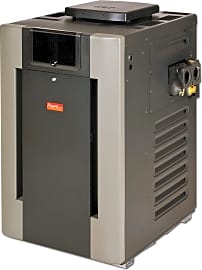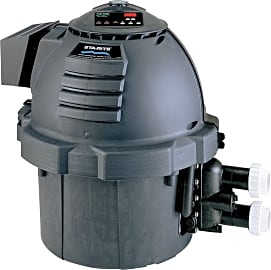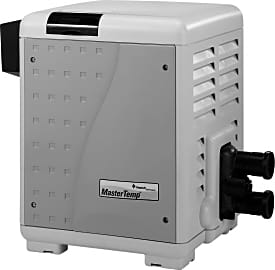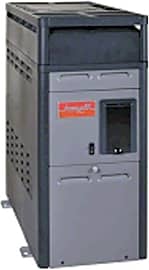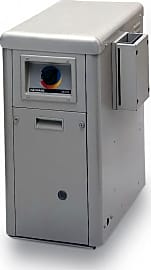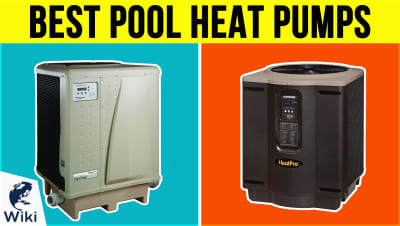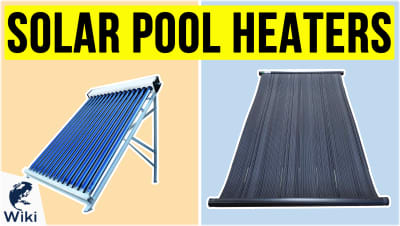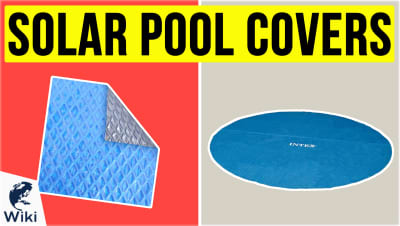The 6 Best Natural Gas Pool Heaters

This wiki has been updated 40 times since it was first published in February of 2017. If you live in a place where outdoor conditions make it tough to consistently keep your water at a comfortable temperature, one of these natural gas heaters will help keep things toasty all year long. The fast-burning fuel will quickly heat your entire pool, making these a dependable and efficient option, plus, they’re often less expensive to run than electric alternatives. When users buy our independently chosen editorial selections, we may earn commissions to help fund the Wiki.
Editor's Notes
October 19, 2020:
It was a fairly smooth round of updates, with most of our picks maintaining their positions, although we did decide on replacing the Hayward H400 with the Hayward H-Series – a smart line of heaters that span in size from 150,000 BTU to 400,000 BTU, and feature standard cupronickel heat exchangers – and we ended up eliminating the Lochinvar Energyrite, due to availability issues. In its place, we added the Raypak 014784 — which boasts a wind-resistant design that makes it suitable for outdoor use, but still provides provisions for venting, for users who’d like to install it indoors.
A note on methods of pool heating:
Natural gas pool heaters are a mainstay in the pool-heating space, and are generally considered the fastest and most effective way to heat your water. However, thanks to their dependency on fossil fuels, they aren’t the most environmentally friendly option out there, and can end up costing you quite a lot in utility bills, over time.
Heat pumps, which depend on a combination of electricity and ambient air to heat water, are often presented as an eco-conscious alternative to natural gas heaters. Although they can be more expensive up front, you can also expect them to save you money in the long term, as they won’t drive up your natural gas bill. While heat pumps can be a great solution for users living in temperate locations, the colder it gets, the less effective they are. So, if you, like me, own a pool in a cold climate, a heat pump may not be the most practical choice for you.
Solar pool heaters are most often used in small, above-ground installations, as they’re rarely rated to service large, in-ground pools. Some in-ground pool owners have still been known to use these systems to help take the bite out of their water, as they’re relatively affordable and present virtually no maintenance costs after installation, but if you really want warm water, there’s a good chance that you won’t be satisfied using one these apparatuses as your sole source of heat.
Solar pool covers definitely aren’t the most efficient or effective way to heat your pool, but they're typically the most affordable, and also often make for a sensible, supplementary source of heat. Even if you’ve got a high-traffic pool that leaves you with little opportunity to keep it covered during the day, solar pool covers can still go a long way, helping to keep heat trapped inside at night — not to mention keeping loose debris out of your water.
May 16, 2019:
When choosing a pool heater, it's a significant investment so it makes sense to choose well-known brands that will stand behind their products. This is one of the many reasons the Lochinvar Energyrite takes the number one spot, for its three year warranty on the heat exchanger. It also features thoughtful design choices like multiple venting options and gasket-free design that make it easier to install and maintain.
The Lochinvar and all the other choices on this list meet strict air quality standards. In addition we removed the Jandy Pro Series from the list due to availability it's lack of availability.
Special Honors
Pentair UltraTemp ETI With titanium heat exchangers, this top-end hybrid combines a 93%-efficient gas-fired unit and a heat pump, inside a single cabinet. Run in tandem, the machine uses programming logic to determine the most economical way to heat your pool, but they can each be run separately as well, according to the user's preference. pentair.com
Come On In; The Water’s Fine
When you swim in a heated pool, you actually have a better chance at getting a superior workout.
It’s one of the tensest moments of any summer’s day. You’ve slapped on a bathing suit (beach body or not), and you’ve brought yourself to the edge of a swimming pool. Inside the pool, you know there’s a deep sense of refreshment waiting, as well as an opportunity for some excellent cardiovascular exercise. And yet, you’re frozen there, paralyzed by the fear of that first split second when the frigid water will stun you into momentary misery. Finally, you jump.
If you were to take this literal leap of faith into a pool that turned out to be heated, you’d be in for one of the most pleasant surprises imaginable. Not only do heated pools get rid of that first shock that accompanies the plunge into an unheated pool, they also keep the water at just the right temperature to still provide relief on a hot summer day.
When you swim in a heated pool, you actually have a better chance at getting a superior workout. This starts psychologically, as even the internal struggle to will yourself into cold water can sap some of the energy you’d otherwise spend swimming. Once you’re in the water, the cold can be demoralizing. Physically, things look even worse, as lower temperatures inhibit muscle contraction, making the swimming experience more difficult. If the water is too cold, you may find that it takes your body much longer to acclimate to it, and that you’ll want to get out of the water sooner.
None of these problems plague you when you swim in a heated pool. You’ll have no problem diving in and getting straight to work (or fun), your muscles will feel looser and more capable, and you’ll be able to stay in the pool comfortably for much longer stretches of time.
Regardless of its physical or psychological impact, however, there’s a wonderful, economical reason to heat your pool water. After all, a pool is a big investment, and nothing is more tragic that a picturesque backyard in-ground pool that nobody uses. With a heated pool, not only will people be likely to swim more often, they’ll also have the opportunity to swim earlier and later in the year than they otherwise would. Even in Southern California, pool water gets uncomfortably cold from about November through to May, due mostly to the cooling effect of evaporation. With a heated pool, in a climate like that, you could swim pretty much all year round.
Why Go With Natural Gas?
There are a few types of pool heaters on the market that you can choose from, and many of them will do a good job making your pool water much more comfortable. There are a few good reasons to go with Natural gas over some other models, however.
There are a few good reasons to go with Natural gas over some other models, however.
Perhaps most importantly, gas pool heaters in general (whether natural gas or propane), tend to be much more powerful and effective. If you have a particularly large pool, or if you know that your pool will only get sporadic use (perhaps you’re a frequent traveler), then gas is the smart choice. It can heat up a large body of water much more quickly than its electrical counterparts can. Gas pool heaters can also often attain a higher temperature than electrical models, and they can be more exacting when it comes to hitting a specific temperature and holding it.
From a financial standpoint, natural gas is often less expensive to burn than your electricity is to use. In the case of a pool heater, this effect is even more evident, since most owners keep their pools heated for long stretches of time, and because the superior heating speed of a gas pool heater requires the unit to run less often.
From an environmental standpoint, the burning of natural gas is cleaner than the coal that fires the vast majority of electrical power in the United States. How much cleaner? Well, according to the Union of Concerned Scientists, despite natural gas being a band-aid on the gaping wound that is climate change, it does emit about 50 percent less carbon dioxide than coal when responsibly burned.
If you really want to get the most bang for your buck, while also protecting the environment from additional pollutants, you should combine your natural gas pool heater with some form of solar pool covering. The solar effect is minimal, to be honest, barely affecting the water’s temperature by more than a degree or so, but the units’ ability to prevent heat loss through evaporation will help keep your pool water warmer for longer periods, so you won’t have to run your heater as often.
A Brief History Of Swimming Pools
While the modern home swimming pool is something of a recent phenomenon, human beings, like most animals, have gravitated towards water since prehistoric times. It wasn’t until the ancient city of Mohenjo-Daro that we find evidence of humans intentionally digging a place for aquatic recreation. Later, the Romans tamed mass quantities of water for use by their elite. One notable difference between our supremely sanitized swimming environments and the Roman example is that the Roman emperors often kept fish in their pools, rendering their pools little more than enormous aquariums in which they, too, would enjoy a dip.
Over the course of the next 50 years, pool ownership exploded, with in-ground and above ground varieties fit for nearly any living space.
Pools remained a luxury item only available to the super rich until large community pool clubs began to crop up in England in the 1800s. This remained the model for recreational swimming until after the second world war, when the baby boomers in America began buying up property and building affordable houses with large backyards.
Over the course of the next 50 years, pool ownership exploded, with in-ground and above ground varieties fit for nearly any living space. In the 1970s, engineers began competing to find the most economical way to heat a swimming pool, making it more comfortable for longer periods of the year. The result is the litany of options currently flooding the market, though nothing has come close to the economy and efficiency of the modern natural gas pool heater.


